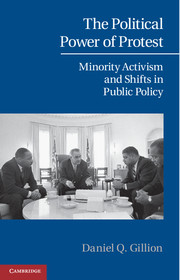Book contents
- Frontmatter
- Contents
- List of Figures
- List of Tables
- Preface
- Acknowledgments
- Introduction
- 1 A Continuum of Information
- 2 Measuring Information in Minority Protest
- 3 Viewing Minority Protest from the Hill
- 4 Knocking on the President’s Door
- 5 Appealing to an Unlikely Branch
- Conclusion
- Appendix A Defining Minority Political Protest
- Appendix B Study Description and Coding Across Multiple Institutions
- Appendix C Time Series Methods
- References
- Index
Appendix A - Defining Minority Political Protest
Published online by Cambridge University Press: 05 February 2013
- Frontmatter
- Contents
- List of Figures
- List of Tables
- Preface
- Acknowledgments
- Introduction
- 1 A Continuum of Information
- 2 Measuring Information in Minority Protest
- 3 Viewing Minority Protest from the Hill
- 4 Knocking on the President’s Door
- 5 Appealing to an Unlikely Branch
- Conclusion
- Appendix A Defining Minority Political Protest
- Appendix B Study Description and Coding Across Multiple Institutions
- Appendix C Time Series Methods
- References
- Index
Summary
The heart of this volume’s assessment of minority protest comes from the Dynamics of Collective Action database. The DCA includes what is arguably the most extensive existing coverage of collective behavior. It includes data on incidents of protest collected from daily reports of the New York Times from 1960 through 1995, encompassing over twenty-one thousand protest events coded by date, event type, target of protest, grievances expressed, and other contextual information on the protest action (size, organizations involved, contentious actions, and more). This NSF-funded project led by Doug McAdam, John McCarthy, Susan Olzak, and Sarah Soule has been widely used to understand protest behavior. The abundance of information it offers allows me to examine protest actions over a contentious period of time for race relations. It also helps me to explain how government’s response to various forms of political protest has changed in the post–civil rights era.
Using the Dynamics of Collective Action dataset, I assemble protest behavior from the following activities: demonstrations, rallies, marches, vigils, picketing, civil disobedience, information distributions, riots, strikes, and boycotts. Second, I focused only on protest events that targeted government. Finally, I declared protest events as minority protest actions based upon the issues that were voiced as opposed to the racial and ethnic identity of the group. The following general issues were used to capture racial and ethnic minority concerns: discrimination, civil rights, voting rights, minority unemployment, welfare, immigration, and education of the underprivileged.
- Type
- Chapter
- Information
- The Political Power of ProtestMinority Activism and Shifts in Public Policy, pp. 161 - 164Publisher: Cambridge University PressPrint publication year: 2013



